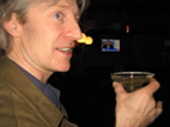Lee Turnpenny is a Research Fellow in the Centre for Human Development, Stem Cells & Regeneration, and the Human Genetics Division at the University of Southampton, UK. An ex-Royal Navy engineer turned geneticist turned developmental biologist, he occasionally escapes from the cell culture hood by jumping into the laundry basket and blogging over at Nature Network.
Why is science important? For one, because of the fact that we ask such a question. It is what Homo sapiens sapiens does in order to make sense of his/her universe, in all its beauty and ugliness, its grandeur and insignificancies, all revealed by science, both of our environment - and of ourselves.
Science is the most socially democratic human endeavour. The knowledge it yields is not the endemic preserve of elites, cliques, business concerns or faiths. Unlike other ‘ways of knowing’, scientific knowledge stands alone, regardless of its discoverer, or elucidator; it belongs to everyone, there to be questioned, challenged, re-appraised and refined, ideological interpretation notwithstanding.
Science isn’t perfect - what do we expect from humans? The historical claims on scientific discovery and prediction may be retrospectively disputable. Its technological applications may be unfairly appropriated, malignly employed, jealously guarded for profit. Yet, the knowledge is (ultimately) ours. Moreover - we pay for it. And science honours our investment, by refusing to brook deceit or fraudulence; it is self-correcting: when transgression occurs, it is science that identifies and exposes. And it is essential now in order to counter pseudoscientific politicising.
Science, like art, surprises, delights and moves us. And - like a true friend - it also tells us things that are discomforting. It mines an inexhaustible seam that fuels our existence.
 Published by
Published by